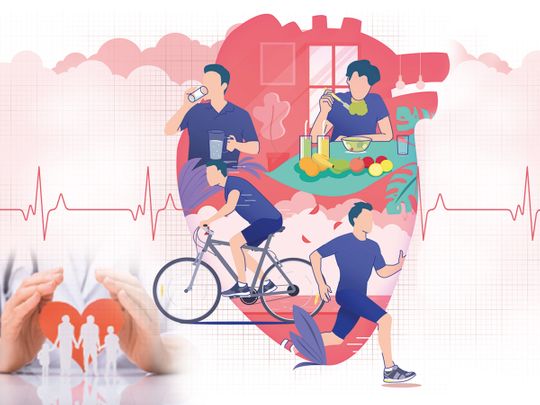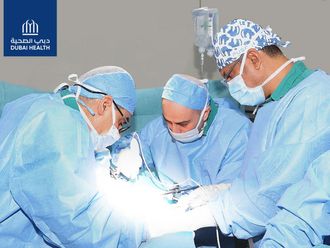
Covid-19 has reinforced the importance of maintaining a healthy heart for our overall well-being. While coronavirus typically impacts the respiratory system, it has major implications on our cardiac health as well.
Having underlying risk factors for heart ailments can make you more vulnerable to Covid-19 complications. Doctors have also noticed that severe Covid-19 can lead to heart damage, including myocarditis, which causes the inflammation of the heart muscle.
“In a few Covid cases, severe myocarditis can cause permanent and irreversible damage to the heart muscle with long-term complications like heart failure and arrhythmias,” says Dr Janardhana Rao Babburi, Specialist Cardiologist at Aster Clinic, Al Qusais (Damascus St).

In a few Covid cases, severe myocarditis can cause permanent and irreversible damage to the heart muscle with long-term complications like heart failure and arrhythmias.
Some patients also develop blood clots in the deep veins of the legs, which can embolise in the arteries of the lungs, leading to pulmonary embolism (PE), says Dr Faraaz Mohammed, Specialist Cardiologist, Prime Healthcare Group.
“Recovery time varies, and people with heart complications sometimes can take longer to recover from these issues post-Covid,” says Dr Mohammed, adding, “Breathing exercises, hydration, proper evaluation, and treatment may help in early recovery.”
Covid-19-related heart issues
Doctors also point out that many people experience chest pain, palpitations and difficulty in breathing even after recovering from Covid-19.
“Chest pain sometimes can be serious, particularly if it is continuous. Mild shortness of breath is not always a sign of a serious problem, but if someone has breathlessness, along with low oxygen saturation below 92 per cent, then it’s a cause of concern,” warns Dr Babburi.
“Patients can also experience palpitations with a rapid and irregular heartbeat. Postural orthostatic tachycardia syndrome (POTS), which causes a feeling of light-headedness or dizziness, especially upon standing, is one of the most common autonomic imbalance that can happen post-Covid. After recovering from Covid-19, if you have any of these symptoms along with fatigue, poor exercise intolerance, pre-syncope and syncope (feeling of fainting), seek medical attention and hospital care immediately,” he advises.
Live a heart-healthy lifestyle
Whether you’ve recovered from Covid-19 recently or you are just concerned about your general well-being, leading a healthy lifestyle is now more important than ever to reduce your risk of contracting Covid-19 and developing health complications in the future.
Studies have also highlighted that people with cardiovascular risk factors, who adopt a healthy lifestyle, can strengthen their immunity against any viral infection while also reducing the long-term risk from heart disease itself.
Following simple measures such as a healthy diet that can help you manage your weight, uncontrolled diabetes, blood pressure and cholesterol, go a long way in reducing your risk of getting heart disease.
Doctors also say it’s critical to understand that prevention is always the best way to avoid a heart problem and future complications.
Keep blood pressure in check
The starting point for the management of heart health is to control cholesterol and blood pressure.
“Hypertension and diabetes contribute to cholesterol accumulation in the coronary arteries forming deposits called plaques. These can block the arteries, causing heart attack,” says Dr Ali Mohamed Sayed, Consultant of Cardiology at Bareen International Hospital — MBZ City.

Hypertension and diabetes contribute to cholesterol accumulation in the coronary arteries forming deposits called plaques. These can block the arteries, causing heart attack.
“Research shows that patients with hypertension are more vulnerable to the endothelial issues, which make the atherosclerotic plaque more unstable. Endothelium is a thin membrane that lines the inside of the heart and blood vessels and high blood pressure seems to have an association with endothelial dysfunction. Also, abnormal enlargement or thickening of the heart muscles are the usual complications in hypertensive patients. This decreases blood flow and increases cardiac muscle’s need for oxygen,” Dr Sayed explains.
A high waist circumference adds to the further risk of heart diseases. “If waist circumference is more than 88cm in women and 102cm in men, there is a high risk of developing diabetes, high cholesterol and blood pressure,” Dr Sayed says.
Reduce your risks with healthy eating
A balanced meal plan can help you keep your weight in check, manage current health conditions, such as high cholesterol, blood pressure and sugar levels, and also help prevent future problems.
“Include fruits, vegetables, whole grains, low-fat dairy, skinless poultry and fish, nuts, seeds, legumes, and unsaturated vegetable oils in your diet. It is also advised to reduce refined sugar to no more than 25-35 grams per day,” says Dr Babburi.
Dr Sayed highlights the benefits of adopting the Dietary Approaches to Stop Hypertension (DASH) diet plan to lower blood pressure and LDL cholesterol or the bad cholesterol.
“According to the National Heart, Lung, and Blood Institute (NHLBI) studies, DASH diet includes eating low-fat dairy products, poultry, fish such as tuna, salmon, and sardines; beans, nuts, almonds and vegetable oil. This diet helps improve heart health.”
Exercise and cardiovascular health
Regular exercise can reverse damage to sedentary, aging hearts and help prevent risk of future heart failure — if it’s enough exercise and begun in time, according to a study by cardiologists at UT Southwestern and Texas Health Resources.
To reap the most benefit, the exercise regimen should begin by late middle age (before age 65), when the heart apparently retains some plasticity and ability to remodel itself, according to the findings by researchers at the Institute for Exercise and Environmental Medicine (IEEM), which is a collaboration between UT Southwestern Medical Centre and Texas Health Presbyterian Hospital Dallas.

Any type of exercises that can let your heart rate to go up and beat faster is good for your heart.
“Any type of exercises that can let your heart rate to go up and beat faster is good for your heart,” says Marius Reiners, Leisure Director, Etizan Fitness. “Walking and weight training are some of the best exercises for heart health.”
A combination of aerobic workouts, depending on your fitness level, can include walking, running, swimming, burpees, jumping jacks, and other vigorous heart-pumping exercises — these can help you strengthen your heart, says Dubai-based fitness trainer Zainab Fahad. “Strength training activities such as weight lifting and resistance training, are also considered good for heart health.”

Strength training activities such as weight lifting and resistance training, are also considered good for heart health.
High-intensity exercise with longer periods of active recovery is another great way to get a full workout in a short amount of time, says Reiners. “Raising and lowering of your heart rate helps to burn calories and improves the function of your blood vessels.”
However, if you are suffering from an existing heart issue, always seek medical advice before starting any fitness regime. “Working out even for as little as 15 minutes a day can make a difference. Make sure to listen to your body and stop when you feel unwell during your workout,” says Reiners.
Healthy Habits for your heart
Top tips from Dr Faraaz Mohammed, Specialist Cardiologist, Prime Healthcare Group
Eat healthy
Include vegetables, fruits, whole grains, legumes, nuts, plant proteins, lean meat, and fish. Limit refined carbohydrates, saturated fats and avoid trans fats.
Be active and watch your weight
Get 150 minutes of moderate-intensity aerobics or 75 minutes of vigorous activity every week.
Quit smoking
It nearly halves the heart attack risk.
Manage health conditions
If you have hypertension, high cholesterol, diabetes, or other conditions that put you at greater risk, monitor them and make necessary lifestyle changes.
Just what the doctor ordered
Take your medications as prescribed. Do not skip dosage at any time.














